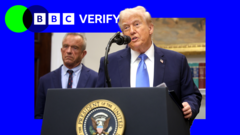What Claims Did Trump Make About Autism and Are They True?

Published: 2025-09-23 15:00:14 | Category: technology
This article explores the recent controversy surrounding US President Donald Trump's claims linking the painkiller Tylenol (paracetamol) to autism, which have been met with strong condemnation from health experts. It examines the accuracy of Trump's statements on autism rates and vaccine safety, as well as the implications of spreading misinformation in public health.
Last updated: 29 October 2023 (BST)
Key Takeaways
- Trump's claims about Tylenol and autism are unsupported by scientific evidence.
- The rise in autism diagnoses is largely due to better awareness and diagnostic practices.
- Experts warn that misinformation about vaccines can lead to public health crises.
- Historical claims linking the MMR vaccine to autism have been thoroughly debunked.
- Limited research exists on autism rates among the Amish and in Cuba.
The Claims: What Did Trump Say?
During a recent press conference at the White House, President Trump, alongside Health Secretary Robert F. Kennedy Jr., made several statements linking Tylenol to autism in children. He suggested that doctors should be advised against prescribing this common painkiller to pregnant women, claiming it could contribute to autism diagnoses.
Trump provided various statistics, alleging a dramatic increase in autism rates over the past two decades. He stated that, 18 years ago, the incidence of autism was approximately "one in 10,000," and projected it would rise to "one in 31" by 2025. While the final claim regarding one in 31 is accurate according to data from the Centers for Disease Control and Prevention (CDC), the initial figure is misleading and not supported by reliable data.
Autism Rates: What the Data Shows
The CDC's data indeed indicates that rates of autism diagnoses have increased over time. However, the rise is largely attributed to improved diagnostic criteria and increased awareness of the condition rather than an actual surge in cases. In 2006, the CDC estimated that one in 110 children had autism, which changed to one in 88 in 2008, illustrating a more gradual increase than Trump suggested.
Experts emphasise that the increased diagnosis rates are due to better screening and greater recognition of autism rather than an epidemic. The American College of Obstetricians and Gynaecologists has dismissed Trump’s assertions as "unsettling" and based on "unreliable data."
Tylenol and Autism: The Evidence
The claim linking Tylenol to autism is not substantiated by scientific research. Paracetamol is widely used and recommended for pain relief during pregnancy, with no credible studies showing a connection to autism. The UK's National Autism Society has labelled Trump's comments as "dangerous, anti-science, and irresponsible."
Ensuring the health and safety of both mothers and unborn children is paramount. The suggestion that Tylenol should be avoided in pregnancy, without any scientific backing, could lead to unnecessary fear and confusion among expectant mothers.
The Vaccine Controversy: MMR and Autism
Additionally, Trump reiterated his long-standing claims regarding the mumps, measles, and rubella (MMR) vaccine. He suggested vaccines should be administered separately rather than in combination, citing potential risks when they are mixed. This claim is rooted in debunked theories stemming from a discredited paper published in 1998 by Andrew Wakefield, which falsely linked vaccines to autism.
Numerous studies have since refuted this theory, including a comprehensive 2019 study from Denmark involving over 657,000 children, which found no connection between the MMR vaccine and autism. The CDC continues to recommend the combined MMR vaccine, asserting that separating the doses could lead to a greater risk of contracting contagious diseases.
The Consequences of Misinformation
Experts warn that spreading unfounded claims about vaccines, particularly from influential figures like Trump, poses a significant risk to public health. The US has recently witnessed its highest number of measles cases in over three decades, with 1,491 confirmed cases and three deaths this year alone. This resurgence underscores the critical importance of maintaining high vaccination rates.
Misleading Comparisons: The Amish and Cuba
During his announcement, Trump also referenced the Amish community and Cuba, claiming that low levels of autism in these groups could be attributed to limited use of Tylenol or vaccines. However, this assertion lacks evidence and overlooks the complexities involved.
Research into autism prevalence within the Amish community is sparse. A study conducted in 2010 found that autism occurred in approximately one in 271 Amish children, challenging Trump's implication that autism is virtually non-existent among them. The reasons for low reported rates may be due to cultural factors, including lower rates of seeking formal diagnoses.
Similarly, Trump's comments regarding Cuba are unfounded, as there are no official statistics confirming low autism rates linked to Tylenol usage. The World Health Organization has indicated that autism prevalence in many low- and middle-income countries remains unknown, further complicating the validity of such comparisons.
The Historical Context of Trump's Claims
Trump's concerns about rising autism rates are not new; he has been vocal about this issue for nearly two decades. His interest in vaccine safety was reignited in 2017 when he suggested that Robert F. Kennedy Jr. lead a vaccine safety task force. Despite his previous stance supporting vaccination campaigns, including during the COVID-19 pandemic, Trump has continued to align himself with anti-vaccine sentiments.
The ongoing discourse surrounding vaccination and autism highlights the importance of relying on sound scientific evidence rather than anecdotal claims. The medical community overwhelmingly supports vaccinations as safe and effective in preventing serious diseases.
Conclusion: The Importance of Informed Health Decisions
As misinformation continues to proliferate, particularly concerning public health, it is crucial for individuals to base their health decisions on reliable data from credible sources. The claims surrounding Tylenol and vaccines exemplify the potential harm that can arise from unfounded assertions.
In an era where health misinformation can lead to significant consequences, it is essential for the public to be discerning consumers of information and to consult healthcare professionals when making decisions about vaccinations and medications. Protecting public health requires a collective effort to promote scientific literacy and uphold evidence-based practices.
FAQs
What is the link between Tylenol and autism?
There is currently no scientific evidence supporting a link between Tylenol (paracetamol) and autism. Medical experts have denounced such claims as unfounded and potentially harmful.
How have autism rates changed over the years?
Autism diagnoses have increased significantly, but this is primarily due to improved awareness and diagnostic criteria rather than a true rise in cases. The CDC reported that rates have grown from approximately one in 110 in 2006 to one in 31 in 2022.
What does the research say about the MMR vaccine and autism?
Numerous studies have found no link between the MMR vaccine and autism. A large-scale study in Denmark concluded that the vaccine does not cause or trigger autism, reaffirming the safety of the combined vaccine.
Why are vaccines important for public health?
Vaccines are vital for preventing serious infectious diseases. High vaccination rates are essential to achieve herd immunity, protecting vulnerable populations and reducing the risk of outbreaks.
What should I do if I have concerns about vaccines?
If you have concerns about vaccines, it’s important to consult with a qualified healthcare professional who can provide evidence-based information and address your questions thoroughly.



